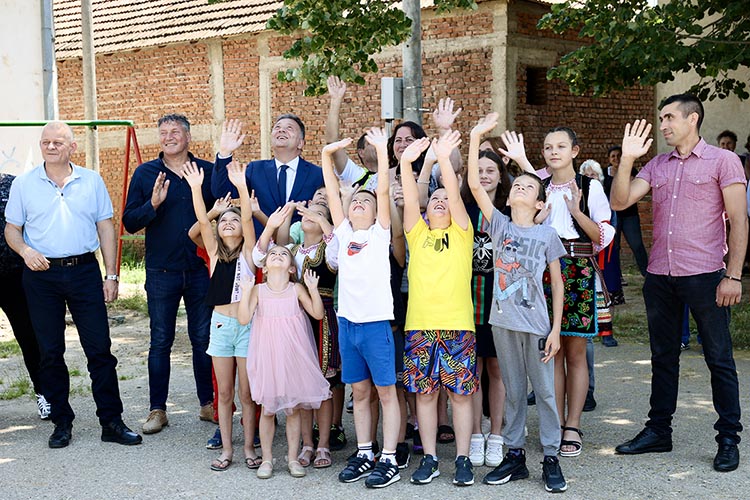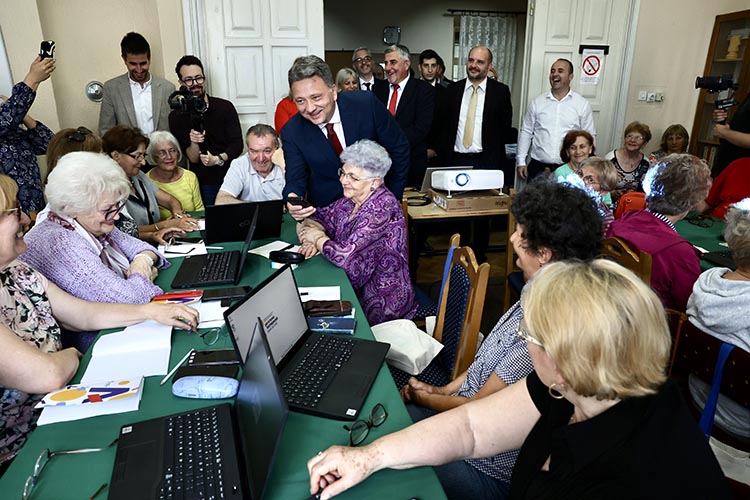Digital Serbia’s place is in a digital Europe, and this is best illustrated by the results we’ve achieved over the past six years. We are continuing to strengthen our country’s economy and invest in the construction of Serbia’s knowledge- and innovation-based economy
Serbia and the EU recently signed an agreement on our country’s participation in the programme Digital Europe 2021-2027. “That’s great news for our sector of information and communications technology, as well as for all our scientists, institutes, researchers and innovators,” says Serbian Information and Telecommunications Minister Mihailo Jovanović. We discussed with Minister Jovanović the continuation of the digital transformation process in Serbia and innovation-based economic development.
This programme has a total value of 7.5 billion euros and implies international cooperation, cooperation with the countries of the Western Balkans, but also economic development support with an emphasis on small and medium-sized enterprises. “The opportunity to apply with high-quality projects in the field of digitalisation will be available to all businesses and individuals registered as residing in the Republic of Serbia, and those include our universities, research organisations, the academic community and all start-ups,” explains our interlocutor. This support relates to grants from European Union funds, while the topics of candidate projects include artificial intelligence, digital connectivity, the development of digital skills, super-computing, the field of advanced use of technology and many others.

All those interested who apply for such financing from EU funds will be on an equal footing with applicants from EU member states when it comes to the allocation of these funds. Conditions for work and development in the field of digitalisation in our country will thus be improved greatly, and thereby also for the growth of foreign direct investments that are extremely helpful in terms of economic and social development.
How satisfied are you with the development of digitalisation in the domain of communication between the public administration and the business sector?
When we introduced digitalisation as one of the priority areas in 2017, at the suggestion of Serbian Prime Minister Ana Brnabić, we accelerated investments in the processes of digitalising public administration and infrastructure construction. We improved the public administration communication system significantly, and via the Government Service Bus (GSB) [Servisne magistrale organa (SMO)] exchanged more than 180 million pieces of data, while sending documents between public administration bodies means that our country’s citizens don’t have to appear at service counters. Citizens can use the eGovernment (eUprava) portal to download various confirmations, such as registry extracts and citizenship confirmation, make payments of numerous administrative fees, schedule their children’s enrolment in nurseries, primary schools and secondary schools.
How much has digitalisation progressed in the field of healthcare?
Digitalisation processes for the healthcare system were launched ten years ago, with the introduction of e-Prescriptions (eRecept) significantly improving the work of healthcare workers and the access of citizens to the healthcare system. Citizens are definitely most familiar with the service “Baby, welcome to the world”, which has enabled parents to initiate procedures while still in the maternity ward for registering their baby’s name, ID number, place of residence and receiving a health insurance card and cash benefits for their child.
We are aware of the fact that places exist where paper and stamps remain crucial, but we are working continuously to digitalise all spheres of the administration where that is essential
More than 400,000 electronic registrations of births have been initiated from maternity wards, which means that parents didn’t need to visit a single service counter and instead received documents for their newborn at their home address. With the further development of digital services in the country, improvements are planned that will represent a new stride forward in terms of quality in the work of the healthcare system, primarily in terms of improving the quality of the health services that are provided to the citizens of Serbia. One of the most important elements of the digital healthcare agenda is the introduction of the eHealth Card, representing a unique card for citizens that will contain all of their personal health information. Another significant project that will impact positively on both the economy and employees is eSick Leave (eBolovanje), representing a system that should fully digitalise the process of realising the right to compensation through the connecting of all relevant institutions.
How will the construction of digital infrastructure and the project to develop broadband infrastructure in Serbia’s rural areas contribute to creating a better business climate in Serbia?
It was in December last year that we launched works on one of the largest projects of the Ministry of Information and Telecommunications, and that is the development of broadband communication infrastructure in rural areas of the Republic of Serbia. The first phase of the project will encompass the construction of a fibre optic route covering approximately 4,700 km, as well as encompassing around 700 rural settlements, almost 120,000 households and approximately 730 schools.

The construction and commissioning of the network in the most rural settlements will be carried out in stages and completed by the end of 2025, by which time we expect over 99% of households in our country to have access to a fixed internet connection speed exceeding 100 Mbps. The introduction of high-speed internet will enable access to e-government services, digital schooling and digital content, even in the smallest separate classes of primary schools. The great advantage of this project is that it will contribute to launching business, as well as the possibility to take advantage of e-commerce that makes agricultural produce and other products available at any time via the internet.
How does the new Law on Electronic Communications contribute to Serbia’s European integration process and the introduction of identical market conditions for all business stakeholders?
The new Law on Electronic Communications strives for full harmonisation with Directive (EU) 2018/1972 of the European Parliament and Council on the establishment of a European Electronic Communications Code. With the introduction of this law, we contributed to fulfilling obligations linked to the Stabilisation and Association Agreement and the adoption of EU acquis within the scope of Chapter 10 – Information society and media.
The introduction of high-speed internet will enable access to e-government services, digital schooling and digital content, even in the smallest separate classes of primary schools
This law encourages the connection and availability of electronic communication networks of the new generation and their use by citizens and businesses, as well as encouraging the development of the market and supporting the improvement of the business environment for all business stakeholders, enabling the more efficient management and use of limited public resources and providing additional protection for end users, while also enabling maximum benefits in terms of the choice, price and quality of services.
| NETWORKING By the end of 2025, over 99% of households in our country will have access to a fixed internet connection speed exceeding 100 Mbps | SUPPORT eSick Leave is a system that should fully digitalise the process of realising the right to compensation through the connecting of all relevant institutions | DEVELOPMENT High-speed fibre-optic internet will enable citizens to do business in any part of the country, which will contribute to the economic development of rural areas |
|---|